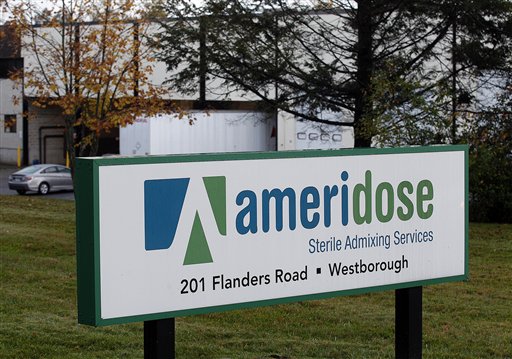A Massachusetts company that supplies medications for several Maine hospitals has recalled all of its products, prompting the Maine Board of Pharmacy to ask that the company give up its license to do business here and a state legislator to suggest more regulation of compounding pharmacies.
Wednesday’s voluntary recall of 2,200 Ameridose products came weeks after another supplier, New England Compounding Center of Framingham, Mass., was forced to recall products because its tainted medication led to an outbreak of fungal meningitis.
So far, 29 deaths and hundreds of infections nationwide have been linked to the contaminated medication, an injectable steroid.
New England Compounding Center’s license has been revoked in Massachusetts. And on Thursday, the Maine Board of Pharmacy voted to suspend the company’s license to operate in Maine.
The board also offered the company a consent agreement that, if approved, would result in the revocation of its license.
Ameridose’s fate in Massachusetts is still uncertain. Federal and state officials only recently decided to investigate the company, out of concern that it might operate similarly to New England Compounding Center, since the companies have some of the same owners.
Ameridose announced its recall in a letter to customers on Wednesday. Although none of its products has been found to be tainted, all were recalled “out of an abundance of caution,” said a news release from the company, because the U.S. Food and Drug Administration had concerns that the company could not demonstrate that its medicines were sterile.
“FDA has notified Ameridose that it will be seeking improvements in Ameridose’s sterility testing process. Ameridose and FDA agree that the use of injectable products that are not sterile can represent a serious hazard to health and could lead to life-threatening injuries and/or death,” the letter reads. “Ameridose has not received any adverse reports related to the products subject to this recall and neither Ameridose nor the FDA has identified impurities in any Ameridose products. … We are undertaking this recall to assure customers that when Ameridose products are shipped, they are fully in conformance with all of the FDA’s recommendations.”
The list of medications recalled by Ameridose runs for 53 pages and includes many well-known products used in hospitals, including lidocaine and morphine. The company’s website indicates that it produces more than 2,200 blended medications, which are injected, taken orally or administered intravenously.
The company has told hospitals to quarantine all Ameridose products and await further instructions for disposal, a process similar to New England Compounding Center’s recall last month. Ameridose officials did not return a call seeking comment.
Ameridose is considered a major supplier of injectable medicines to hospitals across the country. It’s not clear how big a share of Maine’s market it serves. A spokesman for the state’s pharmacy board said that information was not available Thursday.
Barbara Crowley, executive vice president for MaineGeneral Health, which operates hospitals in Augusta and Waterville, said MaineGeneral Health has been a customer of Ameridose, but not a major one.
“We received their letter and have taken everything off the shelf,” she said.
Asked whether her hospitals would be adversely affected by no longer having Ameridose products, Crowley said that in some cases, it will use other medications.
Jill McDonald, spokeswoman for Eastern Maine Medical Center in Bangor, said her hospital has purchased products from Ameridose. Only three were in stock as of Wednesday, and those were pulled from the shelves, she said.
McDonald said that in light of Ameridose’s recall, the hospital will do its compounding in-house for the foreseeable future. She said the hospital could stop buying compounding products from any outside companies.
Ameridose has 30 days to surrender its license in Maine. Pharmacy board Chairman Joe Bruno said he doesn’t think there will be a huge impact if Ameridose no longer does business in Maine. “There are other companies out there,” he said.
State Rep. Sharon Treat, D-Hallowell, attended Thursday’s meeting of the pharmacy board and said she nearly missed action on Ameridose and New England Compounding Center because the board does not identify names or organizations during complaint hearings.
Each complaint is assigned a number, and board members discuss the facts of each complaint, but all identifying information is withheld.
Bruno said that’s standard practice, and information about the companies is made public only after action is taken. After the meeting, Bruno confirmed the action that was taken regarding Ameridose and New England Compounding Center.
Treat, who serves on the Legislature’s Insurance and Financial Affairs Committee, said what has happened in Massachusetts should prompt policymakers here to look at regulation of compounding pharmacies.
Maine does not have facilities that do high-volume compounding — mixing of pharmaceuticals. Compounding is done here on a case-by-case basis, as outlined in state statute.
Treat said Maine should be sure that statute is being followed.
“What we’ve seen in Massachusetts suggests that there hasn’t been a lot of accountability in this area,” she said. “We should be asking if there is adequate enforcement of these rules.”
Staff Writer Eric Russell can be contacted at 791-6344 or at:
erussell@mainetoday.com
Twitter: @PPHEricRussell
Send questions/comments to the editors.


